About
Welcome to our about section, where we’d like to celebrate how our talented alumni fit into our history as a department for political studies.
A brief history of Politics at Liverpool
The current Department of Politics can trace its history back to 1881 with the establishment of the Chair in Philosophy and Political Education at Liverpool. Later, the Diploma for Public Administration was founded in 1930, with the Department we know today being founded as the Department of Political Theory and Institutions back in 1957. The longevity of the Department is a testimony to its capacity to renew whilst retaining a sense of continuity of academic standards which defines the historic and contemporary approach to education.
Professor Ridley joins the Department
The longevity of the Department can be best symbolised by the length of Professor Fred Ridley’s contributions, who joined the Department in 1958. Prof Ridley was highly influential in Merseyside, as well as nationally by acting as the Chief Examiner for the British Government and the joint A-level matriculation board, where he shaped the school curriculum. Prof Ridley held the position of Head of Department for three decades, where he shaped the development of the Department.
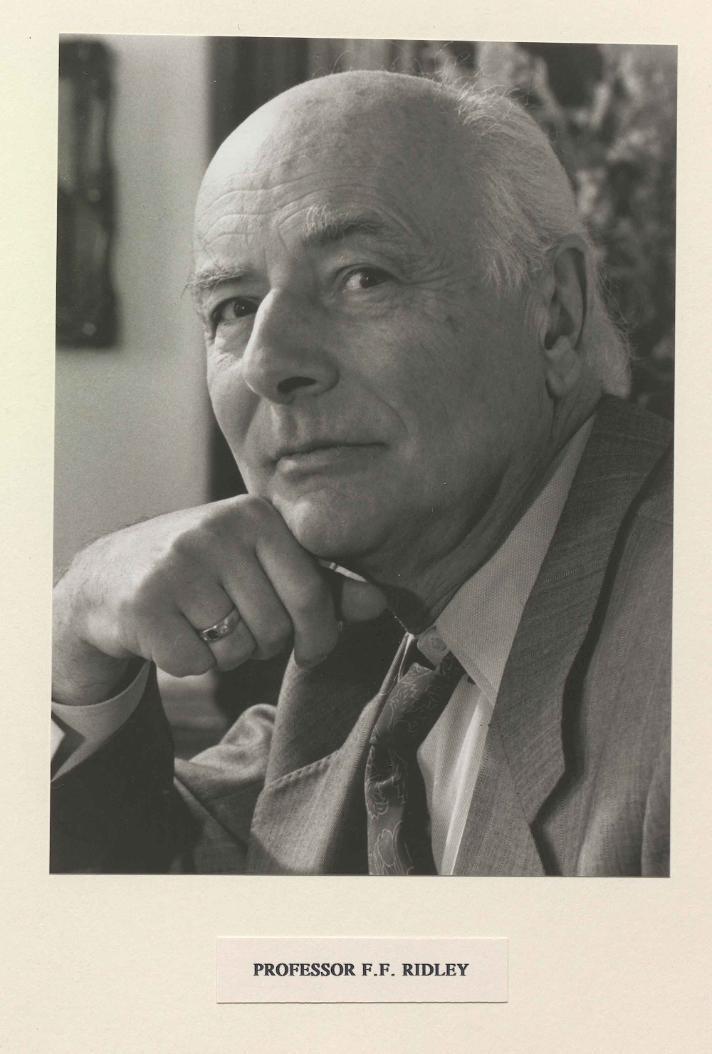 Photograph of Professor Fred Ridley, taken circa 1970 By Courtesy of the University of Liverpool Library: S71C.
Photograph of Professor Fred Ridley, taken circa 1970 By Courtesy of the University of Liverpool Library: S71C.
The Department Post-1965
Figures such as Prof David Morgan (1965), Prof Walter Little (1973), and Benny Pollack (1975) joined the Department. Morgan specialised in Anglo-American Politics and developed a close relationship with Admiral William Crowe (US Ambassador under Bill Clinton), which developed into a close relationship with the Department. Little specialised in Latin American politics, and became a national figure for the numerous television appearances during the Falklands War, whereby he worked on an influential House of Commons Select Committee on Foreign Affairs. Pollack was a specialist in Latin American politics, who developed a media profile for his knowledge of Chile, whereby he was offered the role of Ambassador to China by the Chilean government in 2001. Also, well known elections specialist, Sir John Curtice joined the Department in 1983 at the height of Derek Hatton’s ascendency on Liverpool City Council. Sir John brought his cutting-edge knowledge of technology to political analysis, which added a distinctive edge to Politics at Liverpool. Throughout this and other periods, the Department included noteworthy scholars such as Joe Femia, Dennis Kavanagh, Michael Laver, and the former Labour MP for Ormskirk and later leader of Veritas (and BBC personality) Robert Kilroy-Silk.
The Roxby Building
For a number of years, the Department was based in the Roxby Building, whereby Politics became the School of Politics and Communication Studies. This was later split during a restructuring between Politics and Communication, thereby creating ‘The Department of Politics’.
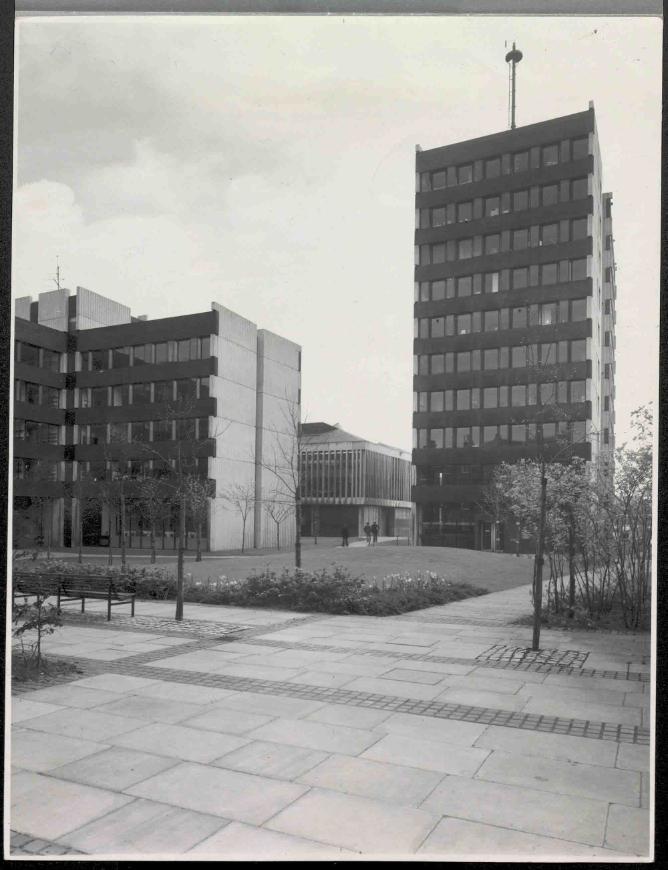 The Roxby Building May 1966, viewed next to what is now the South Campus Teaching Hub. By Courtesy of the University of Liverpool Library: A241F
The Roxby Building May 1966, viewed next to what is now the South Campus Teaching Hub. By Courtesy of the University of Liverpool Library: A241F
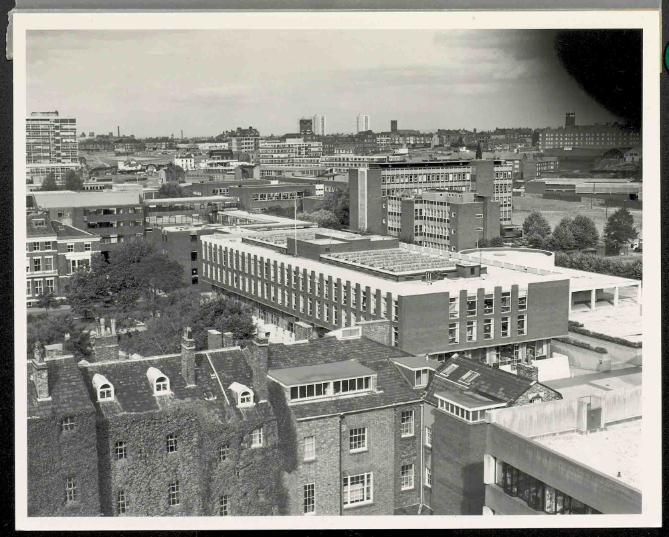 View from the top floor of The Roxby Building, circa 1970. By Courtesy of the University of Liverpool Library: A241F
View from the top floor of The Roxby Building, circa 1970. By Courtesy of the University of Liverpool Library: A241F
John Corner was the final Head of the Department of Politics and Communication Studies before the split between Communications and Politics. The department of Politics began afresh under the leadership of Professor Richard Gillespie, who became Head from 2003/4. Plus, long-serving colleagues such as Neil Gavin were already old hands as the department went forward into the new millennium.
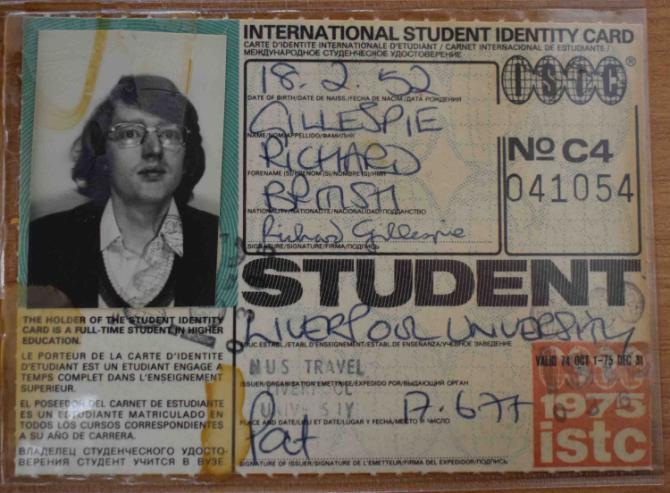 Student ID Card of Prof. Richard Gillespie when he was a student here in 1975
Student ID Card of Prof. Richard Gillespie when he was a student here in 1975
However, it was down to Prof Jon Tonge as Head from 2006 and Dr Erika Harris (promoted to Professor in 2013) to ensure the survival of the Department in 2009, with students and the local Labour MP, Peter Kilfoyle rallying behind the calls to highlight the importance of Politics at Liverpool. With the Department and its future secure, the Department has gone from strength to strength.
Settling down in Abercromby Square
Dr Stuart Wilks-Heeg (promoted to Professor in 2021) then joined the Department as Head in 2014, whereby it underwent a period of substantial growth, with Drs Raul Gomez, Nicholas Lees, and Andrew Roe-Crines joining in 2015. A year later, Politics left its old home in Roxby to take up new residence in the Georgian houses of Abercromby Square (named after Sir Ralph Abercromby, who died at the Battle of Alexandria, 1801). This was, however just the start of the changes, with nine further colleagues joining two years later, thereby transforming the face and curriculum of the Department.
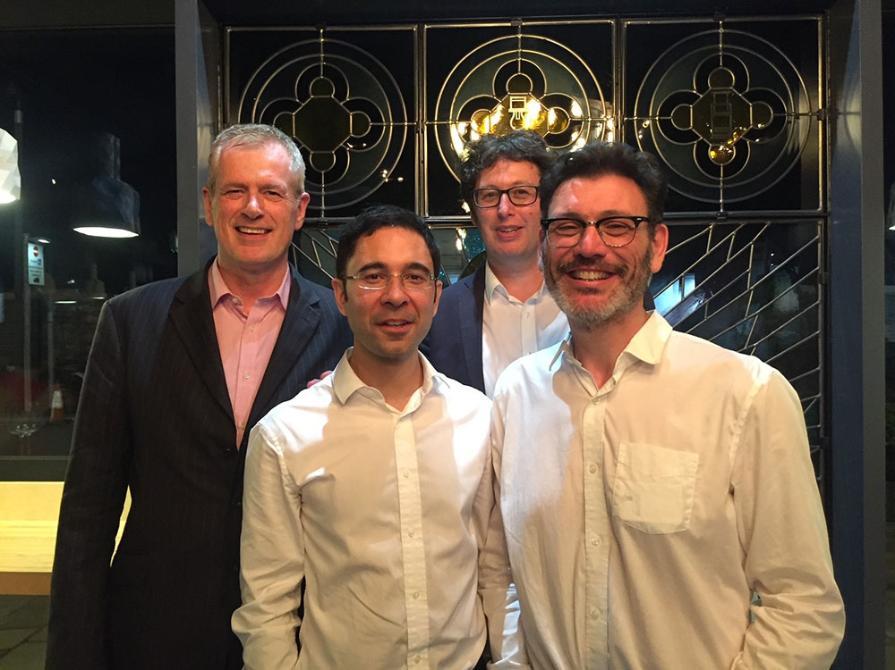 Academics from our Department left-right: Prof. Jon Tonge, Arif Ansari - BBC NW Political Editor from 2011-2016, Prof. Stuart Wilks-Heeg and Prof. Andrew Russell
Academics from our Department left-right: Prof. Jon Tonge, Arif Ansari - BBC NW Political Editor from 2011-2016, Prof. Stuart Wilks-Heeg and Prof. Andrew Russell
This growth helped to solidify what the Department was already doing well, which was to provide students with a unique experience from leading scholars in their respective fields, covering issues such as devolution, identity, local government, electoral behaviour, political communication, ideological controversies, European politics, comparative studies, mental health policy, international studies, philosophy, amongst others.
The Department also specializes in methods training within our second and third year modules which equip students with the practical skills necessary to perform well, both in the academic environment and in future careers. The jewels in the crown also include the competitive Parliamentary Placement Scheme, Local Placement Scheme, the 'Political Broadcasting' module, and the Westminster-backed ‘Contemporary Parliamentary Studies’ module under the leadership of Professor Andrew Russell. Indeed, under Prof Russell’s leadership as Head of Department, Politics continued to expand its curriculum, with a richer range of modules in areas such as gender studies, contemporary ethics, and racial politics. Also, under Prof Russell, the assessment strategy was transformed with more authentic approaches to evaluating academic performance to prepare alumni for the changing workplace.
Under the current leadership of Prof Samantha Ashenden, Politics is continuing to grow and offer diverse modules designed to appeal to a wide range of interests in the established fields of British Politics, international relations, comparative politics, amongst others. By doing so, our student experience provides a cutting edge scholastic experience which also benefits from our extra-curricular activities, such as academic seminars, socials, general election nights in the Guild of Students (as and when necessary!), amongst many others.
-740x384.png) Current Head of Department, Prof. Samantha Ashenden with previous Head of Department Prof. Richard Gillespie
Current Head of Department, Prof. Samantha Ashenden with previous Head of Department Prof. Richard Gillespie
Since the formation of the Department, we have had the privilege of teaching many amazing students who have gone on to do ground-breaking things in a range of sectors, including Politics, government, industry, the third sector, amongst many others. It is here where we’d like to celebrate how our alumni fit into our history as a department for political studies, and their excellent achievements in future careers, so that our current and future students can see the vibrant culture they are joining and explore the inspiring achievements of our alumni.
Contact Andrew Roe Crines on LinkedIn for further information.
.png)